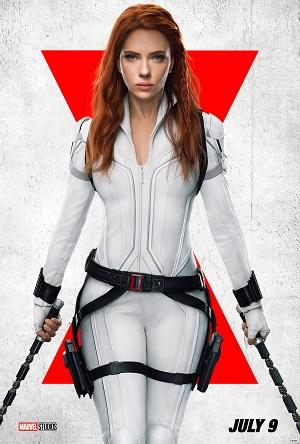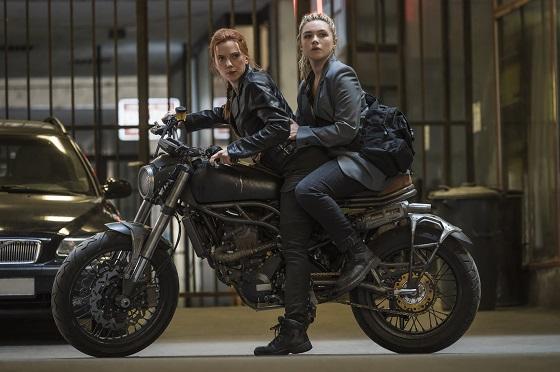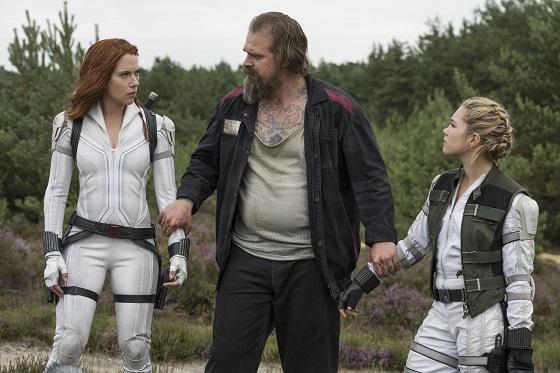
In theaters and on Disney+ with Premier Access July 9

[Rating: Minor Rock Fist Up]
Alternatively interesting, fun, and even funny, the newest installment of Marvel’s sprawling cinematic universe is a good time, albeit in a rerun sort of way. Stuck in a different phase (literally) than the rest of the current canon, Black Widow has trouble working its emotional arc into a broader MCU narrative, one bookended onto it with such clumsy desperation that it almost ruins the larger effort. “Almost” is the key word there, though, because Kevin Feige and co. know how to make a superhero picture, and have assembled all the talent necessary to give Scarlett Johansson a cracking solo vehicle to let her Avenger flag fly high.
Set directly after the events of Captain America: Civil War, Natasha Romanoff (Johansson) is on the run from the authorities following her betrayal of the Sokovia Accords and the loyalist Avenger faction. When a mysterious masked super soldier attacks her one night in pursuit of a mystery parcel, she pieces together clues that lead Natasha to her long-lost sister, Yelena (Florence Pugh). Yelena recently escaped from the same spy academy/organization that trained both of them, and hopes Natasha can help her take down the evil “Red Room” with some of her superhero friends.
Along the way, the ladies seek help from their adoptive parents, Alexei (David Harbour) and Melina (Rachel Weisz), who sent them off to Manchurian Candidate school as kids, and thus have a lot of pent-up resentment and therapy bills to account for. And while director Cate Shortland does a fine job piecing together taut, kinetic action scenes every twenty minutes or so (per Marvel bylaws), her biggest victory in Black Widow is the seamless incorporation of believable trauma and pathos for characters both new and old. Indeed, these feel like real characters with lived-in backstories, and while certain comic book contrivances still abound, there’s genuine emotion on display, here.

To draw this out, the casting department went all-in on talent, and have brought in some ringers for this one. This starts with Pugh, who plays Yelena with a knowing, spunky irreverence that balances a winking acknowledgment of the silliness of this universe with a sincere streak. Throughout Johansson’s seven previous appearances as Natasha, she’s given hints at the trauma she endured as a brainwashed agent of evil, and Pugh’s exploration of this same emotional space brings it and the world of Black Widow to life. Reminding audiences once again why she’s one of the most sought-after actors working today, Pugh cycles through fear, humor, ferocity, and vulnerability with seeming ease, and elevates the movie above the basic popcorn schtick anchoring its foundation.
Harbour and Weisz also play well off each other as one-time parents/spies who are struggling to reconcile their past with their recently reemerged present. Harbour in particular seems to be having a hoot as Russia’s budget Captain America knock-off, and is responsible for some of the funniest moments of the film. Yet even he can’t save Black Widow from its biggest hurdle: a staggering originality deficiency.

Fans of the MCU might not have seen this particular story before, but they’ve seen all of the core elements that act as action guardrails at one point or another. Whether it’s the masked, unstoppable super assassin (Winter Soldier), floating fortresses base (The Avengers), or hypnotized killers (Civil War), most of the big plot and character beats seem a little reheated from earlier, better material. Which is to say that the action is fun and engaging, yet not what one would consider groundbreaking.
And really, that’s okay. Like most origin story installments, Black Widow is just setting the table for a larger world on behalf of a character that might need a dash of unique motivation or character growth now and then, and aside from Black Panther, none of them ever reached the heights of the team-up or sequel installments. Weirdly, though, Black Widow comes after Feige and the Marvel brass killed off their eponymous heroine, making this less of an integrated launchpad for Natasha and more like garnish for work already in the can.
And in that regard it is a success. The events of this film make Natasha’s sacrifice in Avengers: Endgame that much more profound and add some depth and color to earlier conversations about her lack of reproductive choices. The action is crisp and well-staged, and includes an urban car chase that squeezes more excitement, originality, and fun in 5 minutes than box office competitor F9 does in 2+ hours. Recycled villains and set pieces aside, it’s a decent time and an appropriate send-off for a character who deserved an origin story as much as anyone. And while this might not be top-tier MCU, it is a worthy installment in a cinematic superhero cannon that has always made time for the boys, and has only just begun to clear a little space out for the ladies. Granted, in the current MCU timeline Natasha is dead: but when has that ever stopped a superhero from kicking a little ass?





Comments on this entry are closed.